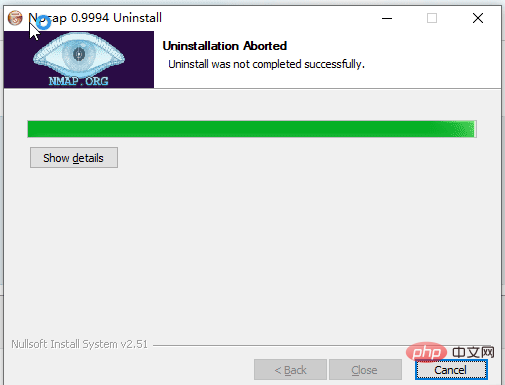
npcap是一个网络数据包抓包工具,是WinPcap的改进版;它支持NDIS 6技术、“只允许管理员Administrator”访问Npcap、与WinPcap兼容或并存两种模式;支持Windows平台的回环数据包采集和发送。

本教程操作环境:windows10系统、Dell G3电脑、Npcap 0.9994。
npcap是什么软件
Npcap是一款著名网络数据包抓包工具WinPcap的改进版。本软件致力于采用Microsoft Light-Weight Filter (NDIS 6 LWF)技术和Windows Filtering Platform (NDIS 6 WFP)技术对当前最流行的WinPcap工具包进行改进。比之前代拥有更好的抓包性能,并且稳定性优异。

软件特点:
1、支持NDIS 6技术;
2、支持“只允许管理员Administrator”访问Npcap;
3、支持与WinPcap兼容或并存两种模式;
4、支持Windows平台的回环(Loopback)数据包采集;
5、支持Windows平台的回环(Loopback)数据包发送;
Npcap 原理
Npcap 实现了 Win10 驱动程序,叫做 NPF(Netgroup Packet Filter),该驱动从 Win10 miniport 驱动获取网卡数据实现监控网络数据包的功能(Win10 使用 miniport 驱动控制网卡)。
Npcap 使用
Npcap SDK 使用起来很简单,一共分为三步。
1、安装 visual studio
我使用的是 visual studio 2019。
2、安装 npcap 到 win10
安装 Npcap 1.71 installer 到 win10 系统中,主要是安装了 NPF 驱动和 dll 文件(Packet.dll 和 Wpcap.dll)。
下载地址:https://npcap.com/#download
3、下载 Npcap SDK
Npcap SDK 中提供了 lib 和头文件,我们编写抓包程序时需要用到这些。
4、例程
这里,我以 Npcap SDK 中的 npcap-sdk-1.13\Examples-pcap\UDPdump 为例进行说明,UDPdump 用于监控收到的 UDP 数据包。
udpdump.c
在原有文件的基础上我添加了 #pragma comment(lib,"ws2_32.lib") 语句,否则 ntohs() 会导致编译失败。
/*
* Copyright (c) 1999 - 2005 NetGroup, Politecnico di Torino (Italy)
* Copyright (c) 2005 - 2006 CACE Technologies, Davis (California)
* All rights reserved.
*
* Redistribution and use in source and binary forms, with or without
* modification, are permitted provided that the following conditions
* are met:
*
* 1. Redistributions of source code must retain the above copyright
* notice, this list of conditions and the following disclaimer.
* 2. Redistributions in binary form must reproduce the above copyright
* notice, this list of conditions and the following disclaimer in the
* documentation and/or other materials provided with the distribution.
* 3. Neither the name of the Politecnico di Torino, CACE Technologies
* nor the names of its contributors may be used to endorse or promote
* products derived from this software without specific prior written
* permission.
*
* THIS SOFTWARE IS PROVIDED BY THE COPYRIGHT HOLDERS AND CONTRIBUTORS
* "AS IS" AND ANY EXPRESS OR IMPLIED WARRANTIES, INCLUDING, BUT NOT
* LIMITED TO, THE IMPLIED WARRANTIES OF MERCHANTABILITY AND FITNESS FOR
* A PARTICULAR PURPOSE ARE DISCLAIMED. IN NO EVENT SHALL THE COPYRIGHT
* OWNER OR CONTRIBUTORS BE LIABLE FOR ANY DIRECT, INDIRECT, INCIDENTAL,
* SPECIAL, EXEMPLARY, OR CONSEQUENTIAL DAMAGES (INCLUDING, BUT NOT
* LIMITED TO, PROCUREMENT OF SUBSTITUTE GOODS OR SERVICES; LOSS OF USE,
* DATA, OR PROFITS; OR BUSINESS INTERRUPTION) HOWEVER CAUSED AND ON ANY
* THEORY OF LIABILITY, WHETHER IN CONTRACT, STRICT LIABILITY, OR TORT
* (INCLUDING NEGLIGENCE OR OTHERWISE) ARISING IN ANY WAY OUT OF THE USE
* OF THIS SOFTWARE, EVEN IF ADVISED OF THE POSSIBILITY OF SUCH DAMAGE.
*
*/
#ifdef _MSC_VER
/*
* we do not want the warnings about the old deprecated and unsecure CRT functions
* since these examples can be compiled under *nix as well
*/
#define _CRT_SECURE_NO_WARNINGS
#endif
#include <pcap.h>
#include <time.h>
#include <winsock.h>
#pragma comment(lib,"ws2_32.lib")
#ifdef _WIN32
#include <tchar.h>
BOOL LoadNpcapDlls()
{
_TCHAR npcap_dir[512];
UINT len;
len = GetSystemDirectory(npcap_dir, 480);
if (!len) {
fprintf(stderr, "Error in GetSystemDirectory: %x", GetLastError());
return FALSE;
}
_tcscat_s(npcap_dir, 512, _T("\\Npcap"));
if (SetDllDirectory(npcap_dir) == 0) {
fprintf(stderr, "Error in SetDllDirectory: %x", GetLastError());
return FALSE;
}
return TRUE;
}
#endif
/* 4 bytes IP address */
typedef struct ip_address
{
u_char byte1;
u_char byte2;
u_char byte3;
u_char byte4;
}ip_address;
/* IPv4 header */
typedef struct ip_header
{
u_char ver_ihl; // Version (4 bits) + Internet header length (4 bits)
u_char tos; // Type of service
u_short tlen; // Total length
u_short identification; // Identification
u_short flags_fo; // Flags (3 bits) + Fragment offset (13 bits)
u_char ttl; // Time to live
u_char proto; // Protocol
u_short crc; // Header checksum
ip_address saddr; // Source address
ip_address daddr; // Destination address
u_int op_pad; // Option + Padding
}ip_header;
/* UDP header*/
typedef struct udp_header
{
u_short sport; // Source port
u_short dport; // Destination port
u_short len; // Datagram length
u_short crc; // Checksum
}udp_header;
/* prototype of the packet handler */
void packet_handler(u_char* param, const struct pcap_pkthdr* header, const u_char* pkt_data);
int main()
{
pcap_if_t* alldevs;
pcap_if_t* d;
int inum;
int i = 0;
pcap_t* adhandle;
char errbuf[PCAP_ERRBUF_SIZE];
u_int netmask;
char packet_filter[] = "ip and udp";
struct bpf_program fcode;
#ifdef _WIN32
/* Load Npcap and its functions. */
if (!LoadNpcapDlls())
{
fprintf(stderr, "Couldn't load Npcap\n");
exit(1);
}
#endif
/* Retrieve the device list */
if (pcap_findalldevs(&alldevs, errbuf) == -1)
{
fprintf(stderr, "Error in pcap_findalldevs: %s\n", errbuf);
exit(1);
}
/* Print the list */
for (d = alldevs; d; d = d->next)
{
printf("%d. %s", ++i, d->name);
if (d->description)
printf(" (%s)\n", d->description);
else
printf(" (No description available)\n");
}
if (i == 0)
{
printf("\nNo interfaces found! Make sure Npcap is installed.\n");
return -1;
}
printf("Enter the interface number (1-%d):", i);
scanf("%d", &inum);
/* Check if the user specified a valid adapter */
if (inum < 1 || inum > i)
{
printf("\nAdapter number out of range.\n");
/* Free the device list */
pcap_freealldevs(alldevs);
return -1;
}
/* Jump to the selected adapter */
for (d = alldevs, i = 0; i < inum - 1; d = d->next, i++);
/* Open the adapter */
if ((adhandle = pcap_open_live(d->name, // name of the device
65536, // portion of the packet to capture.
// 65536 grants that the whole packet will be captured on all the MACs.
1, // promiscuous mode (nonzero means promiscuous)
1000, // read timeout
errbuf // error buffer
)) == NULL)
{
fprintf(stderr, "\nUnable to open the adapter: %s\n", errbuf);
/* Free the device list */
pcap_freealldevs(alldevs);
return -1;
}
/* Check the link layer. We support only Ethernet for simplicity. */
if (pcap_datalink(adhandle) != DLT_EN10MB)
{
fprintf(stderr, "\nThis program works only on Ethernet networks.\n");
/* Free the device list */
pcap_freealldevs(alldevs);
return -1;
}
if (d->addresses != NULL)
/* Retrieve the mask of the first address of the interface */
netmask = ((struct sockaddr_in*)(d->addresses->netmask))->sin_addr.S_un.S_addr;
else
/* If the interface is without addresses we suppose to be in a C class network */
netmask = 0xffffff;
//compile the filter
if (pcap_compile(adhandle, &fcode, packet_filter, 1, netmask) < 0)
{
fprintf(stderr, "\nUnable to compile the packet filter. Check the syntax.\n");
/* Free the device list */
pcap_freealldevs(alldevs);
return -1;
}
//set the filter
if (pcap_setfilter(adhandle, &fcode) < 0)
{
fprintf(stderr, "\nError setting the filter.\n");
/* Free the device list */
pcap_freealldevs(alldevs);
return -1;
}
printf("\nlistening on %s...\n", d->description);
/* At this point, we don't need any more the device list. Free it */
pcap_freealldevs(alldevs);
/* start the capture */
pcap_loop(adhandle, 0, packet_handler, NULL);
return 0;
}
/* Callback function invoked by libpcap for every incoming packet */
void packet_handler(u_char* param, const struct pcap_pkthdr* header, const u_char* pkt_data)
{
struct tm* ltime;
char timestr[16];
ip_header* ih;
udp_header* uh;
u_int ip_len;
u_short sport, dport;
time_t local_tv_sec;
/*
* unused parameter
*/
(VOID)(param);
/* convert the timestamp to readable format */
local_tv_sec = header->ts.tv_sec;
ltime = localtime(&local_tv_sec);
strftime(timestr, sizeof timestr, "%H:%M:%S", ltime);
/* print timestamp and length of the packet */
printf("%s.%.6d len:%d ", timestr, header->ts.tv_usec, header->len);
/* retireve the position of the ip header */
ih = (ip_header*)(pkt_data +
14); //length of ethernet header
/* retireve the position of the udp header */
ip_len = (ih->ver_ihl & 0xf) * 4;
uh = (udp_header*)((u_char*)ih + ip_len);
/* convert from network byte order to host byte order */
sport = ntohs(uh->sport);
dport = ntohs(uh->dport);
/* print ip addresses and udp ports */
printf("%d.%d.%d.%d.%d -> %d.%d.%d.%d.%d\n",
ih->saddr.byte1,
ih->saddr.byte2,
ih->saddr.byte3,
ih->saddr.byte4,
sport,
ih->daddr.byte1,
ih->daddr.byte2,
ih->daddr.byte3,
ih->daddr.byte4,
dport);
}5、执行
比如监控无线网卡收到的数据。
想要查阅更多相关文章,请访问PHP中文网!!
Das obige ist der detaillierte Inhalt vonWelche Software ist npcap?. Für weitere Informationen folgen Sie bitte anderen verwandten Artikeln auf der PHP chinesischen Website!